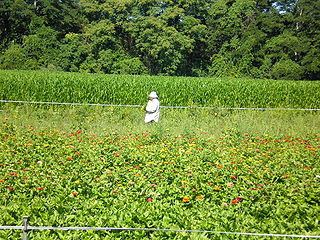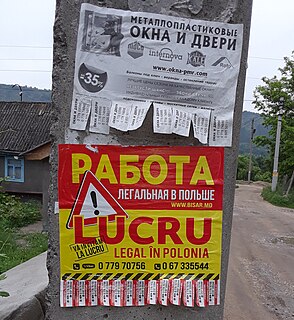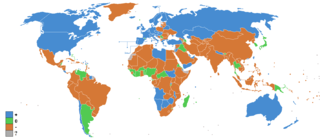Related Research Articles

Human capital flight refers to the emigration or immigration of individuals who have received advanced training at home. The net benefits of human capital flight for the receiving country are sometimes referred to as a "brain gain" whereas the net costs for the sending country are sometimes referred to as a "brain drain". In occupations that experience a surplus of graduates, immigration of foreign-trained professionals can aggravate the underemployment of domestic graduates, whereas emigration from an area with a surplus of graduates leads to better opportunities for the ones left. The other way around, with occupations or areas with a lack of graduates, emigration will lead to more difficulties concerning the area.

Human migration involves the movement of people from one place to another with intentions of settling, permanently or temporarily, at a new location. The movement often occurs over long distances and from one country to another, but internal migration is also possible; indeed, this is the dominant form of human migration globally. Migration is often associated with better human capital at both individual and household level, and with better access to migration networks. Age is very also important for both work and non-work migration. People may migrate as individuals, in family units or in large groups. There are four major forms of migration: invasion, conquest, colonization and emigration/immigration.

Foreign workers or guest workers are people who work in a country other than one of which they are a citizen. Some foreign workers use a guest worker program in a country with more preferred job prospects than in their home country. Guest workers are often either sent or invited to work outside their home country, or have acquired a job before they leave their home country, whereas migrant workers often leave their home country without having a specific job in prospect.
An economic migrant is someone who emigrates from one region to another, including crossing international borders, seeking an improved standard of living, because the conditions or job opportunities in the migrant's own region are insufficient. The United Nations uses the term migrant worker.

A migrant worker is a person who either migrates within their home country or outside it to pursue work. Migrant workers usually do not have the intention to stay permanently in the country or region in which they work.

A remittance is a transfer of money, often by a foreign worker to an individual in their home country. Money sent home by migrants competes with international aid as one of the largest financial inflows to developing countries. Workers' remittances are a significant part of international capital flows, especially with regard to labor-exporting countries.

The economy of Kerala is the ninth largest in India, with an annual gross state product (GSP) of ₹9.78 lakh crore in 2020–2021. Per-capita GSP of Kerala during the same period is ₹205,484 (US$2,917.97), the sixth largest in India. The service sector dominates the Kerala economy, accounting for 64% of the gross value added in the state in the 2018-2019 period.

International migration occurs when people cross state boundaries and stay in the host state for some minimum length of time. Migration occurs for many reasons. Many people leave their home countries in order to look for economic opportunities in another country. Others migrate to be with family members who have migrated or because of political conditions in their countries. Education is another reason for international migration, as students pursue their studies abroad. While there are several different potential systems for categorizing international migrants, one system organizes them into nine groups: temporary labor migrants; irregular, illegal, or undocumented migrants; highly skilled and business migrants; refugees; asylum seekers; forced migration; family members; return migrants; and long-term, low-skilled migrants. These migrants can also be divided into two large groups, permanent and temporary. Permanent migrants intend to establish their permanent residence in a new country and possibly obtain that country’s citizenship. Temporary migrants intend only to stay for a limited periods of time; perhaps until the end of a particular program of study or for the duration of a their work contract or a certain work season. Both types of migrants have a significant effect on the economies and societies of the chosen destination country and the country of origin.

The Center for Global Development (CGD) is a nonprofit think tank based in Washington, D.C. and London that focuses on international development.

İbrahim Sirkeci is a British Turkish management scientist, Ria Financial Professor of Transnational Studies and Marketing at the European Business School London, Regent's University London, and Director of Regent's Centre for Transnational Studies.

Remittances to India are money transfers from non-resident Indians (NRIs) employed outside the country to family, friends or relatives residing in India. India is the world's top receiver of remittances, claiming more than 12% of the world's remittances in 2015. Remittances to India stood at US$68.968 billion in 2017 and remittances from India to other countries totalled US$5.710 billion, for a net inflow of US$63.258 billion in 2017.

Xoom Corporation, also Xoom, a PayPal Service is an electronic funds transfer or remittance provider that allows consumers to send money, pay bills and reload mobile phones from the United States and Canada to 131 countries. The company was founded in 2001, is based in San Francisco, CA, and has an office in Guatemala City, Guatemala. In November 2015, PayPal acquired Xoom Corporation for $25 a share, to a total of about $1.09 billion. Prior to that, Xoom was an independent publicly traded company and was initially backed by venture firms including Sequoia Capital, New Enterprise Associates, SVB Capital, and Fidelity Ventures.
The Philippine Labor Migration Policy of the Philippine government allows and encourages emigration. The Department of Foreign Affairs, which is one of the government's arms of emigration, grants Filipinos passports that allow entry to foreign countries. The Philippine government enacted the Migrant Workers and Overseas Filipinos Act of 1995 in order to "institute the policies of overseas employment and establish a higher standard of protection and promotion of the welfare of migrant workers and their families and overseas Filipinos in distress."

Jørgen Carling is a Norwegian researcher specializing on international migration. He holds a PhD in Human Geography from the University of Oslo and is Research Professor of Migration and Transnationalism Studies. Carling has worked at the Peace Research Institute Oslo (PRIO) since 2002, where he has been Research Director since 2012.
Women migrant workers from developing countries engage in paid employment in countries where they are not citizens. While women have traditionally been considered companions to their husbands in the migratory process, most adult migrant women today are employed in their own right. In 2017, of the 168 million migrant workers, over 68 million were women. The increase in proportion of women migrant workers since the early twentieth century is often referred to as the "feminization of migration".
The Global Knowledge Partnership on Migration and Development (KNOMAD) is an initiative of the World Bank that describes itself as "envisaged to be a global hub of knowledge and policy expertise on migration and development issues." The goal is to have it work in close collaboration with the Global Forum on Migration and Development and the Global Migration Group.
Devesh Kapur is the Director of Asia Programs and Starr Foundation Professor of South Asian Studies at The Johns Hopkins University School of Advanced International Studies (SAIS). Formerly, he was the director at the Center for the Advanced Study of India, Madan Lal Sobti Associate Professor for the Study of Contemporary India, and Professor of Political Science at the University of Pennsylvania. He is also a non-resident fellow at the Center for Global Development. He is also a monthly contributor to Business Standard, an Indian business news daily, and an occasional contributor to Project Syndicate.
David McKenzie is a lead economist at the World Bank's Development Research Group, Finance and Private Sector Development Unit in Washington, D.C. His research topics include migration, microenterprises, and methodology for use with developing country data.
Hometown associations (HTAs), also known as hometown societies, are social alliances that are formed among immigrants from the same city or region of origin. Their purpose is to maintain connections with and provide mutual aid to immigrants from a shared place of origin. They may also aim to produce a new sense of transnational community and identity rooted in the migrants' country of origin, extending to the country of settlement. People from a variety of places have formed these associations in several countries, serving a range of purposes.
International money transfers made by migrant workers and immigrants sending a portion of their earnings to their families in their country of origin are known as remittances. Remittances are an important aspect of the global economy, totaling an estimated $601 billion (USD) for the year 2015. The United States is currently the largest source of international remittances in the world, sending a total of $56.3 billion in 2015. Mexico received the largest portion of these remittances, accounting for an estimated $25.2 billion, making the U.S.-Mexico remittance corridor one of the largest in the world. With the exception of the 2008 global financial crisis, remittances sent from the U.S. have been consistently climbing for the past half century. This major increase in remittances can be partially attributed to the larger population of immigrants and migrant workers, as well as to increasing globalization in the financial and money markets. China and India are also major recipients of U.S. remittances, and are the top two recipients of remittances globally.
References
- 1 2 3 DeParle, Jason (22 April 2007). "A Good Provider Is One Who Leaves". The New York Times . Retrieved 28 May 2014.
- ↑ DeParle, Jason (17 March 2008). "World Banker and His Cash Return Home". The New York Times. Retrieved 28 May 2014.
- ↑ "Contact Us". KNOMAD. Archived from the original on 30 March 2014. Retrieved 28 May 2014.
- ↑ "People Move: A blog about migration, remittances, and development". World Bank. Retrieved 28 May 2014.
- ↑ "Dilip Ratha". Migration Policy Institute . Retrieved 28 May 2014.
- ↑ DeParle, Jason (18 November 2007). "Migrant Money Flow: A $300 Billion Current". The New York Times. Retrieved 28 May 2014.
- ↑ Tavernise, Sabrina (25 November 2008). "In global crisis, flow of migrant money stalls". The New York Times. Retrieved 28 May 2014.
- ↑ Bennhold, Katrin (7 March 2011). "From Afar, Moneymaker and Mother". The New York Times. Retrieved 28 May 2014.
- ↑ DeParle, Jason (20 April 2007). "The developing world's absent providers" . Retrieved 28 May 2014.
- ↑ Bellman, Eric (25 April 2014). "Why Does India Beat China In the Remittance Game?". The Wall Street Journal . Retrieved 28 May 2014.
- ↑ Jordan, Miriam (23 September 2012). "Migrants' Cash Keeps Flowing Home". The Wall Street Journal. Retrieved 28 May 2014.
- ↑ Kole, William J. (18 August 2007). "Migrant Cash Is World Economic Giant". The Washington Post . Associated Press . Retrieved 28 May 2014.
- ↑ "For Some Immigrants, a Balancing Act". The Washington Post. Retrieved 28 May 2014.
- ↑ Ferguson, Tim (13 October 2003). "Aid That Works". Forbes . Retrieved 28 May 2014.